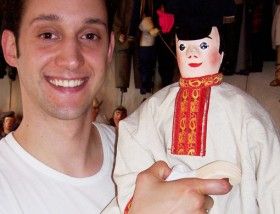It's 8.33pm and the audience hushes as Toone VIII, aka Nicolas Geal, strides down an aisle of warped floorboards to stand before a diminutive stage. "Mesdames et messieurs, bonsoir," he says, greeting the crowd in French.
He wears a white T-shirt and canvas pants. He clutches his handwritten script, a chewed-up wad of paper, against his chest. He grins and waits for a swell of good-evenings back.
The crowd complies.
He switches to Flemish.
"Dames en heren ..."
It's a packed house. People sit slightly slumped on 12 rows of backless wooden benches in this 17th-century building off Brussels' medieval central square.
Then, after a third greeting, in English, and a slight bow, he disappears through a side door. Behind the tiny stage, thuds and creaks suggest a tale in ferment.
On to stage-centre swoops a Capulet princeling, whose graceful hand gestures and minute head-flicks belie an otherwise wooden presence.
Well, partly wooden. He is also straw, glue and a touch of plaster.
Thus begins the tale of Romeo and Juliet, acted out by puppets manipulated by seven pairs of hands and voiced one and all by the Toone, or the 26-year-old Geal.
"Ooy! Ooy!" says a Capulet to a Montague, counting bodies from a pile after their opening sword fight. "How many on your side?"
"Three and a half."
"A half?"
"Oh, he's an illegal immigrant," he says, nodding toward a still-flickering body. "Found him in the church."
Illegal-immigrant debate
Knowing chuckles come from the audience; the illegal-immigrant debate is as current in Belgium as it is in Europe at large. Churches are a common sanctuary.
This isn't your average creaky classic. Salt a piece of Shakespeare with snippets of current affairs and pop culture, add a pinch of ribaldry, and slather with bruxellois, a thick-accented dialect mixing Flemish and French that is dying fast amid the cosmopolitan babel of this capital of Europe, and the result is something as idiosyncratic, hearty and seemingly slapdash as waterzooi, a creamy local stew.
"Where's Romeo?" Mercutio asks. Love-struck again, no doubt. And here he comes now: little Woltje. The audience lets out a sigh of recognition for the theatre's star-snub-nosed, head the size of a child's fist and appearing to drown in his blue silken Romeo garb.
He is smaller than the other puppets and the only one to appear in each play of the theatre's repertoire, always wearing his trademark black-and-white checkered cap and armed with earnestness, common sense and sheer spirit.
He is said to have been the inspiration for Tintin, an intrepid Belgian comic-strip character with a red-haired quiff.
The Friar is downing a homemade potion he says he concocted from beer and Viagra, "to lift my spirits," he adds, spearing the air with his bottle when Woltje-as-Romeo comes calling to arrange his wedding with Juliet.
Toone history
Each Toone inherits his own Woltje puppet. The Toone title is conferred in a merit-based succession that dates to the 1830-1890 reign of Toone the Ancient, or Antoine Genty, from whose first name the title is derived.
Toone VII, Jose Geal, 75, abdicated the Tooneship three years ago to make room for his son Nicolas. Still a forceful presence around the theatre, Jose resurrected it from decay in 1963 and moved it to its current home.
It is today, the sole remaining adult puppet theatre of about 45 that were active in Brussels' working-class Marolles district in the early 1900s. Back then, illiterate folk gathered for two shows in a sitting. The first, like today's, would parody the classics, including the operas frequented by the beau monde at the nearby Theatre Royal de la Monnaie. A second would be a current-affairsy free-for-all. It was infotainment for the masses.
At 9.22, intermission, father Toone and his son mingle with the audience in the adjoining bar-museum, its walls hung with at least a hundred of the theatre's 1,003 puppets. Nicolas's brother, Jose, serves beer.
A cowbell rings at 9.43 for act two.
The messenger-monk dispatched to inform Romeo of Juliet's feigned death confesses that he was "waylaid" at the Abbaye d'Orval — a famous Belgian brewery.
The show gathers speed. Tybalt dies. Mercutio dies. Paris dies. Romeo dies. Juliet lives! Juliet dies.
The death scenes are milked for full comic effect, a different pirouette or bloodcurdling cry with each expiration.
At 10.27, the elder Toone leans in through the main door, wearing a checkered cap to match Woltje's. His face is carved with enough expression lines to make him seem cartoonish even without his title. That's all, folks? "If you liked it, tell your friends," he says, with a wink. "If you didn't, keep it between us."



